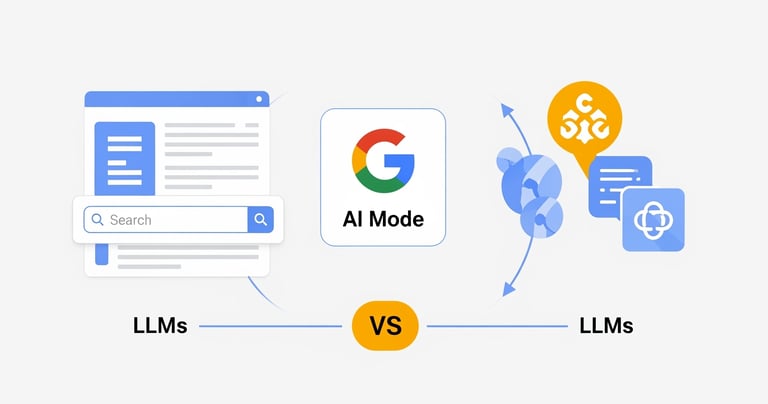How Google’s AI Mode Compares to Traditional Search and Other LLMs
How Google’s AI Mode Compares to Traditional Search and Other LLMs [AI Mode Study
Sunnynithi
7/2/20255 min read


Introduction
The search landscape underwent a significant transformation in 2025 with the launch of AI Mode by Google, which has fundamentally altered user interactions with online information. AI Mode represents an innovative generative AI experiment within Google Search, allowing it to explore the web more thoroughly than conventional searches on Google, aiding users in uncovering even more of what the internet provides and locating highly relevant content tailored to their inquiries. This detailed analysis compares Google's AI Mode with traditional search techniques and other prominent large language models (LLMs) such as ChatGPT, Claude, and various AI assistants.
Understanding Google's AI Mode
What is AI Mode?
AI Mode employs a tailored version of Gemini 2.5, enabling users to pose longer, more intricate, or nuanced inquiries that would have once necessitated multiple searches. In contrast to standard search, which generates a list of links, AI Mode delivers conversational and detailed answers straight within the search interface.
Key Features and Capabilities
Advanced Query Processing: Queries in AI Mode are twice as lengthy compared to traditional searches, with users following up on results about 25% of the time. Users are now entering queries that are twice as long as those in traditional searches, seeking detailed responses to intricate questions.
Multi-part Questioning: AI Mode enables users to pose multi-part inquiries via Google's search engine, providing comprehensive answers through features like query fan-out.
Source Integration: The foundational model is designed to effectively link to sources, ensuring that the responses are transparent and credible.
Enhanced Personalization: Google aims to improve the search experience by delivering more personalized and conversational interactions.
Traditional Search vs. AI Mode: A Detailed Comparison
Search Methodology
Traditional Search:
Keyword-based queries
Returns ranked list of web pages
Users must navigate through multiple sources
Limited to simple, direct questions
Average query length: 2-3 words
AI Mode:
Natural language conversations
Provides synthesized, comprehensive answers
Integrates information from multiple sources automatically
Handles complex, multi-faceted queries
Early testers are asking much longer queries - 2-3x the length of traditional searches
User Experience Differences
Information Discovery: Traditional search requires users to:
Formulate keyword-based queries
Sift through search results pages
Open multiple tabs and websites
Synthesize information manually
AI Mode offers:
Conversational query input
Direct, comprehensive answers
Automatic source synthesis
Follow-up question capabilities
Query Complexity: Google finds that people know when to use regular Search and when to use AI Mode, suggesting distinct use cases for each approach.
Traffic and Publisher Impact
Links featured in AI Overviews receive higher click rates compared to when the page is displayed as a standard web listing for that search query, suggesting that AI-enhanced search can effectively increase traffic for content creators while enhancing user experiences.
Google AI Mode vs. Other LLMs: Comprehensive Analysis
Performance Comparison with Leading LLMs
Accuracy and Factual Reliability
Google AI Mode (Gemini 2.5): Public evaluations show that Gemini 2.5 has a slight edge in factual Q&A accuracy and consistency, likely due to its vast context and updated training data.
ChatGPT: ChatGPT's GPT-4/4.5 models remain excellent general problem-solvers, often praised for their logical reasoning.
Claude: Claude gives you straightforward answers, unlike the other contemporaries like ChatGPT and Gemini.
Specialized Use Cases
Academic Research: Gemini 2.5 Pro dominates here. The massive context window means analyzing entire dissertations, comparing multiple studies, and maintaining citation accuracy throughout. Researchers report 70% time savings on literature reviews.
Creative Tasks: While Gemini has stronger research and technical accuracy, ChatGPT helps you in creative tasks and building human-like conversations.
Professional Applications: For everyday personal assistance, go with ChatGPT. For writing and professional coding, Claude is worth the premium.
Unique Advantages of Each Platform
Google AI Mode Strengths
Real-time Information Access: Direct integration with Google's search index
Source Transparency: Built-in citation and source linking
Web-scale Knowledge: Access to the most current information available online
Context Integration: Seamless integration with Google's ecosystem
Cost-effectiveness: Gemini has by far the most cost-effective models and also best-in-class multimodal capabilities
ChatGPT Advantages
Conversational Flow: More natural dialogue capabilities
Creative Output: Superior performance in creative writing and brainstorming
User Interface: Polished, intuitive chat interface
Plugin Ecosystem: Extensive third-party integrations
Claude Advantages
Safety and Reliability: More cautious and accurate responses
Professional Applications: Excellent for business and technical writing
Detailed Analysis: Thorough, well-structured responses
Ethical Considerations: Strong focus on responsible AI use
Technical Performance Metrics
Response Quality
Accuracy: Gemini 2.5 leads in factual accuracy
Coherence: ChatGPT excels in conversational flow
Depth: Claude provides most comprehensive analysis
Speed: Google AI Mode benefits from search infrastructure
Context Handling
Google AI Mode: Unlimited web context through search integration
Gemini 2.5: Massive context windows for document analysis
ChatGPT: Solid context retention within conversations
Claude: Excellent long-form context understanding
User Behavior and Adoption Patterns
Query Evolution
The introduction of AI Mode has fundamentally changed how users formulate searches:
Traditional Search Patterns:
Short, keyword-focused queries
Multiple searches for complex topics
Manual information synthesis
AI Mode Patterns:
2-3x longer queries than traditional searches
Complex, multi-part questions
Conversational follow-ups
Expectation of comprehensive answers
Use Case Differentiation
People know when to use regular Search and when to use AI Mode, suggesting that users are developing distinct preferences:
Traditional Search Preferred For:
Quick fact-checking
Finding specific websites
Shopping and local searches
Time-sensitive information
AI Mode Preferred For:
Complex research questions
Analysis and comparison tasks
Learning new concepts
Multi-step problem solving
Business and SEO Implications
Impact on Digital Marketing
Google's AI focus in 2025 means even more users will engage with AI Overviews instead of scrolling down to other search results. Businesses need to make sure they're positioned for this shift.
Content Strategy Adaptations
Traditional SEO Focus:
Keyword optimization
Link building
Page ranking factors
AI Mode Optimization:
Authoritative content creation
Source credibility
Comprehensive topic coverage
Structured data implementation
Publisher Considerations
The shift to AI Mode presents both challenges and opportunities:
Opportunities:
Links included in AI Overviews get more clicks than traditional web listings
Quality content gets amplified through AI synthesis
Direct attribution through source linking
Challenges:
Reduced direct website visits
Need for AI-optimized content strategies
Competition for featured citations
Future Implications and Trends
Evolution of Search Behavior
The introduction of AI Mode represents a paradigm shift toward:
Conversational information discovery
Expectation of synthesized, comprehensive answers
Reduced tolerance for manual information gathering
Increased demand for real-time, accurate responses
Competitive Landscape
The AI search space is rapidly evolving with:
Google's integration advantage through search infrastructure
OpenAI's conversational AI expertise
Anthropic's focus on safety and reliability
Emerging competitors developing specialized solutions
Technology Integration
Future developments likely include:
Enhanced multimodal capabilities
Better personalization algorithms
Improved source attribution systems
Advanced context understanding
Best Practices for Users
When to Use Traditional Search
Quick factual lookups
Finding specific websites or resources
Local business information
Shopping and price comparisons
Time-sensitive news updates
When to Use AI Mode
Complex research projects
Learning new subjects
Comparative analysis
Multi-step problem solving
Comprehensive topic exploration
When to Use Other LLMs
ChatGPT: Creative projects, casual conversation, brainstorming Claude: Professional writing, detailed analysis, safety-critical applications Specialized AI: Domain-specific tasks requiring particular expertise
Key takeaways :
Google's AI Mode signifies a notable advancement in how we discover information, connecting traditional search methods with conversational AI. While Google introduced AI Overviews as a pathway to its next-gen search functionality, AI Mode fulfills that vision by merging the breadth of web searches with the interactive features of sophisticated language models.
When comparing these platforms, it becomes evident that each has unique advantages: Google AI Mode shines in providing real-time information and integrating sources, ChatGPT excels in maintaining conversational flow and creativity, whereas Claude offers the most dependable and thorough analysis. The decision to use these tools increasingly hinges on particular use cases rather than a clear hierarchy of effectiveness.
For users, the essential point is recognizing when to capitalize on each tool's advantages. Traditional search remains effective for quick, straightforward inquiries, while AI Mode revolutionizes how we tackle intricate research and education. Other language models still cater to niche needs, ranging from creative projects to professional evaluations.
As this technology advances, we can anticipate deeper integration of search and AI functionalities, enhancing the intuitiveness, thoroughness, and personalization of information discovery. The future of search is not about completely replacing traditional techniques, but about equipping users with the appropriate tool for every information requirement, whether it’s a quick fact verification or an in-depth exploration of complex subjects.
The introduction of AI Mode indicates a wider shift towards conversational methods of seeking information, fundamentally altering our engagement with the extensive wealth of human knowledge online. This evolution aims to render information more accessible while upholding the trustworthiness and scope that have made Google Search essential for billions globally.
Note : This analysis relies on data and insights available as of July 2025. Given the swiftly changing landscape of AI technology, the capabilities and performance evaluations may evolve as these platforms progress and improve.
How Google's AI Mode Compares to Traditional Search and Other LLMs [AI Mode Study]
Explore knowledge, trends, and updates for growth.
Connect
sunnynithi@enlightment.me
© 2025. All rights reserved.
Links
Dramas


Follow us